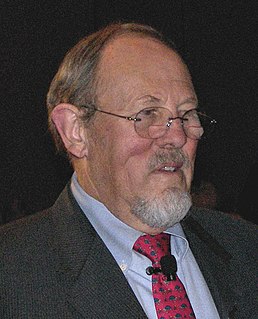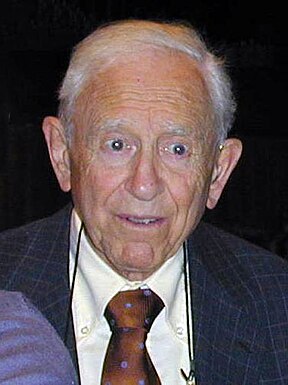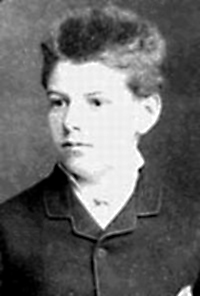| Paul H. Cootner | |
|---|---|
| Born | May 24, 1930 Logansport, Indiana |
| Died | April 16, 1978 (aged 47) Stanford, California |
| Nationality | American |
| Alma mater | Massachusetts Institute of Technology |
| Doctoral advisor | Walt Whitman Rostow |
Paul Harold Cootner (May 24, 1930 – April 16, 1978) [1] was a financial economist noted for his book The Random Character of Stock Market Prices .
Financial economics is the branch of economics characterized by a "concentration on monetary activities", in which "money of one type or another is likely to appear on both sides of a trade". Its concern is thus the interrelation of financial variables, such as prices, interest rates and shares, as opposed to those concerning the real economy. It has two main areas of focus: asset pricing and corporate finance; the first being the perspective of providers of capital, i.e. investors, and the second of users of capital.
Cootner was born in Logansport, Indiana. He attended the University of Florida, where he earned bachelor's and master's degree. He received a PhD in industrial economics from the Massachusetts Institute of Technology in 1953.

Logansport is a city in and the county seat of Cass County, Indiana, United States. The population was 18,396 at the 2010 census. Logansport is located in northern Indiana at the junction of the Wabash and Eel rivers, northeast of Lafayette.

Indiana is a U.S. state located in the Midwestern and Great Lakes regions of North America. Indiana is the 38th largest by area and the 17th most populous of the 50 United States. Its capital and largest city is Indianapolis. Indiana was admitted to the United States as the 19th U.S. state on December 11, 1816. Indiana borders Lake Michigan to the northwest, Michigan to the north, Ohio to the east, Kentucky to the south and southeast, and Illinois to the west.

The University of Florida is an American public land-grant, sea-grant, and space-grant research university in Gainesville, Florida, United States. It is a senior member of the State University System of Florida. The university traces its origins to 1853 and has operated continuously on its Gainesville campus since September 1906.
He worked at Brown University briefly before serving in the Army. He then joined Resources for the Future.

Brown University is a private Ivy League research university in Providence, Rhode Island. Founded in 1764 as the College in the English Colony of Rhode Island and Providence Plantations, it is the seventh-oldest institution of higher education in the United States and one of the nine colonial colleges chartered before the American Revolution.

The United States Army (USA) is the land warfare service branch of the United States Armed Forces. It is one of the seven uniformed services of the United States, and is designated as the Army of the United States in the United States Constitution. As the oldest and most senior branch of the U.S. military in order of precedence, the modern U.S. Army has its roots in the Continental Army, which was formed to fight the American Revolutionary War (1775–1783)—before the United States of America was established as a country. After the Revolutionary War, the Congress of the Confederation created the United States Army on 3 June 1784 to replace the disbanded Continental Army. The United States Army considers itself descended from the Continental Army, and dates its institutional inception from the origin of that armed force in 1775.

Resources for the Future (RFF) is an American nonprofit organization that conducts independent research into environmental, energy, and natural resource issues, primarily via economics and other social sciences. Headquartered in Washington, D.C., RFF performs research around the world. Founded in 1952, the institution is widely recognized as a pioneer in the field of resource economics.
He joined finance faculty of the MIT Sloan School of Management in 1959, where he started work on the "random walk" theory of securities prices, work that led to the 1964 publication of his groundbreaking book.

The MIT Sloan School of Management is the business school of the Massachusetts Institute of Technology, in Cambridge, Massachusetts, United States. MIT Sloan offers bachelor's, master's, and doctoral degree programs, as well as executive education. Its MBA program is among the most selective in the world. MIT Sloan emphasizes innovation in practice and research. Many influential ideas in management and finance originated at the school, including the Black–Scholes model, the Solow–Swan model, the random walk hypothesis, the binomial options pricing model, and the field of system dynamics. The faculty has included numerous Nobel laureates in economics and John Bates Clark Medal winners.
The random walk hypothesis is a financial theory stating that stock market prices evolve according to a random walk and thus cannot be predicted. It is consistent with the efficient-market hypothesis.
In 1970, he left MIT to join the faculty of the Graduate School of Business at Stanford University.

The Stanford Graduate School of Business is the graduate business school of Stanford University in Stanford, California.

Leland Stanford Junior University is a private research university in Stanford, California. Stanford is known for its academic strength, wealth, proximity to Silicon Valley, and ranking as one of the world's top universities.
He died unexpectedly of a heart attack in 1978.









